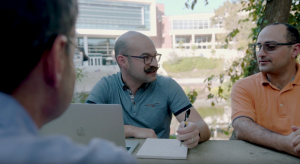Learning Activities
23 Group Problem-Solving Online
Jennifer Smith
Delphi Method of Problem Solving | Student Instructions | References
Delphi Method of Problem Solving

Practicing solving genetics problems is the heart of the UF course “PCB3063 Genetics.” Dr. Thomas Niehaus and Jennifer Smith designed a series of asynchronous discussion board posts to allow online students to solve problems that would be too difficult for a student to solve alone.
The Rand Corporation originally created the “Delphi Method” for defense research. It was a time-efficient method to gain consensus from a group of experts. (Linstone & Turoff, 2002). Features of this technique include:
- The opportunity for all group members to make a meaningful contribution.
- Asynchronous communication (very helpful for busy online students!)
- Three or more rounds of discussion.
- In order to keep the Genetics students moving through the course material, the Delphi rounds were limited to two in this course.
How to use the Delphi Method
- Explain how it works (adapt the student instructions below).
- Create a problem that is too difficult for a student to solve alone
- Create groups of 5 – 7 students
- Create a separate Canvas discussion forum for each Delphi Round
- Allow threaded replies
- Users must post before seeing replies (important!)
- Graded (if desired)
- Allow liking
- Tip: use a short name such as Wk# DD1 to avoid expanding the gradebook too much
- Assign the discussion to your student groups.
- Create a Canvas Assignment for the final solution submission.
- Assign to everyone
- Allow sufficient time between each of the Delphi discussion rounds and the assignment submissions for students to view the solutions proposed by their peers and re-think their own solution.
- Be sure to provide an opportunity for students to ask questions about the problem.
Example of Student Instructions
Preparation
- Watch the chapter overview video.
- View the notes and do the reading in the eText.
- Take the chapter quiz (6 points).
Delphi Discussion Round 1
- Take your best stab at working the problems in the problem set.
- Post your first attempt in the Delphi Discussion – 1 forum (2 points)
- Read the posts from the other members of your group.
- Ask questions about what others have done.
- Respond to questions with your thoughts.
- Use the “like” to tag solutions you think are correct.
Delphi Discussion Round 2
- Armed with the thoughts from your group, take another stab at solving the problem.
- Post your second attempt in the Delphi Discussion – 2 forum (2 points)
- Read the posts from the other members of your group.
- Ask any questions.
- Respond to questions with your thoughts.
- Use the “like” to tag solutions you think are correct.
Final Solution
- Submit your final solution to the Canvas Assignment tool. (4 points)
- You can enter text and use the formula tool within the submission box OR
- You can photograph your solution and upload the image file OR
- You can attach a Word document to your submission.
If you find you are having trouble with the problem sets
- Post your question on the FAQ Discussion Forum.
- These questions will be answered during office hour web conference.
- Attend one of the office hour sessions via Zoom.
- View the recording of the office hour.
Meet with members of your group (you can use Zoom for this) to work on the problem sets. NOTE: If members of your group can’t meet when you can, post on the FAQ Discussion to find study partners. (Niehaus & Smith, 2017)
References
- Linstone, H. A., & Turoff, M. (2014, August). Linstone and Turoff – The Delphi Method: Techniques and Applications. Retrieved January 08, 2021, from https://www.scribd.com/document/264836379/Linstone-and-Turoff-The-Delphi-Method-Techniques-and-Applications
- Niehaus, T., & Smith, J. (2017, August). PCB3063 Genetics. Retrieved from University of Florida Canvas course site.

